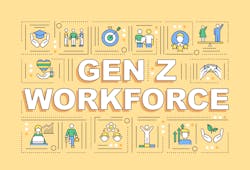Each generation brings something different to the workplace. Gen Z is no exception. This group, born between 1997-2012, are 68.6 million strong and comprise 20% of the U.S. population. Two of their strongest characteristics are thoughtfulness and determination. And this is true even in the early stages of their career. That’s good news for safety managers (a group predominantly made up of Baby Boomers and Gen Xers) tasked with training and engaging a workforce from succeeding generations (Millennials and Gen Zers).
When Gen Z workers were asked by Tallo (a recruiting platform for young workers) how long they would like to stay in their first job, the answer was three years. While that might not seem long to older generations who stayed in jobs many years, this is a considerable period.
Tallo’s Early Talent Playbook specifically asked these workers what would keep them at their jobs. At the top of the list (70%) was personal development. They want a work environment that prioritizes learning, which would include company assistance for additional education. They want mentors and internal promotions.
Besides personal development, young employees desire a connection (67%), which was defined as being “on a team with people I really like.”
The next five preferences are as follows:
Impact—working in a career that has a significant impact on society, culture and others (62%).
Money—primarily compensation (60%)
Flexibility—allowing for a work-life balance, flexible schedules and work options, e.g., remote, hybrid (57%).
Company culture—a strong internal culture, in particular a safety culture, as well as perks (45%).
Employment brand—a company that has great public perception or brand (16%).
Another requirement for young workers is finding purpose in their work. In fact, work and purpose are so closely tied together that, according to a 2020 McKinsey study, 70% of employees say their personal sense of purpose is defined by their work. And the good news for employers is that when these two align, employees perform better and are committed. They are also about half as likely to go looking for a new job.
In a recent article on the BBC, Aaron De Smet, a senior partner at McKinsey, explained the evolution of purpose from a historical perspective. “The search for meaning at work is a relatively new idea,” he noted. “The Industrial Revolution made work very ‘transactional’: people worked and got paid money to live, with no greater purpose required or expected. But over time, as decent working conditions and a paycheck became simple fundamentals, workers began to want more.”
Wanting more than money is demonstrated by a survey of Gen Z workers done by jobsite Monster, which found that 70% of those surveyed said purpose was more important than pay.
Another essential trait found in Gen Z is the desire to be their own boss. Almost 62% of this generation said they have either started or intend to start their own business, according to data from WP Engine and the Center for Generational Kinetics.
And these entrepreneurs are willing to put in the hours to see their dreams become reality. A survey from Microsoft showed that 91% of Gen Z entrepreneurs work unconventional hours; 81% say they work on vacation, compared to 62% of business owners overall.
Understanding this entrepreneurial focus, companies can design work differently, including levels of ownership of a particular job or providing side projects that employees can own.
All these characteristics and desires of Gen Z provide conscientious employers roadmaps as to how to hold onto this talent and how to ensure their physical as well as emotional needs are protected in the workplace.
About the Author
Adrienne Selko
Senior Editor
Email [email protected]
Adrienne Selko is also the senior editor at Material Handling and Logistics and is a former editor of IndustryWeek.

